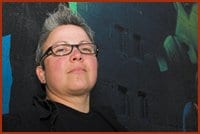Life-changing inspiration can come in strange packages. For musician and Westfest producer Elaina Martin, it was the violence of her coming out days that served as a catalyst for community-building, and better things to come.
“It was the violence and homophobia that created a synergy,” Martin says. “We were tired of all the spaces that we were inhabiting being attacked.”
Martin, who grew up in Sudbury and came out as a dyke at the age of 17, remembers how the only gay club in town was regularly broken into and attacked by aggressive locals. It was a violent time of brawls and gaybashing, which came to a feverish pitch the night a mob of local men collapsed one of the bar’s walls by pushing on it with their bare hands.
“It was very difficult — I have all the false teeth to show it,” says Martin. “It’s hard for young queers today to understand the things that happened back then. I’m so glad that they don’t have to [go through it], but I remember.
Martin and her friends in the tight-knit Sudbury gay scene knew that their community needed something powerful to counteract this sense of being constantly under attack.
“We wanted to create art to combat our negative experiences, so we started having music nights and readings,” says Martin. “I hadn’t even sung before this! I just sang and taught myself how to play the guitar doing Patsy Cline covers. So that’s really how I got started in music — out of a need to bring a community together.”
Out of that initial desire came a 15-year career as a musician that took Martin all over North America, appearing with notable acts like Jann Arden, Tegan and Sara, the Indigo Girls and Sarah Harmer. But, in 2002, feeling that same urge to create community and celebrate art, Martin decided to set down her guitar to try her hand at full-time event production instead.
Her first major project in the festival arena was the short-lived but popular Rock City Women’s Fest, an independent summer music festival that took place at Morrison’s quarry just outside of Wakefield, Quebec in 2001 and 2002.
“That was a learning experience!” says Martin. “The first year, [Rock City] was modelled after very closed women’s music festivals like Women’s Voices. The second year, we opened it up and it was much more fun. I love fags, and I love trannies. I have friends of all sorts, and I want them in on my party.”
Martin took the lesson of inclusivity from her Rock City days and applied it even more broadly to the annual event she started after: Westfest, which takes place in Ottawa’s Westboro Village each June.
Now in its fifth year, Westfest is bigger than ever. It’s estimated that up to 50,000 people will attend the dozens of Westfest concerts and events happening this year. The five-day extravaganza includes music, theatre, lit readings, performance art and spoken word events — and, amazingly, the $300,000 production is completely free to the public.
“We’ve worked really hard to make Westfest accessible and inclusive,” says Martin. “Art isn’t that accessible. We think it is, but it’s not. At this festival, it doesn’t matter how much money your family has, you can still come down and experience everything that everyone else does. So, as long as I run this show, it’s going to be free because you can’t be accessible otherwise.”
Coming full circle this year, Martin’s fifth WestFest is paying homage to her Mohawk and Métis roots with the theme: A Celebration of Canadian Aboriginal Women in Music.
“It’s our five-year anniversary, and being a musical woman from an aboriginal background, I feel it’s a fitting theme,” says Martin. “I think of Westfest as an extension of myself, so it’s pretty queer, pretty aboriginal and very focussed on music.”
For more festival information, visit westfest.ca

 Why you can trust Xtra
Why you can trust Xtra


